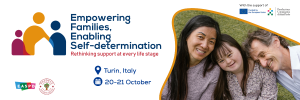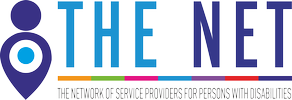“Empowering families, enabling self-determination: Rethinking support at every life stage”

The recent EASPD Conference was extremely rich in conclusions, particularly in recognizing the need to revise the “special service” perspective of most service providers for persons with disabilities towards a more holistic approach that accompanies individuals throughout their lives.
“It reminded all service providers for persons with disabilities that the long-term care of persons with disabilities cannot be the sole responsibility of their families,” wrote EASPD President Kirsi Konola in her note at the end of the Conference. Kirsi Konola, wrote in her note at the end of the conference. Instead, she said, families must have organized support, cooperation, and participation from service providers at all stages of the life of the person with a disability, with the goal of living in the community.
Several good practices were presented for supporting people with disabilities throughout their lives in the community by service providers, with the active participation of their families and the state.
At the same time, however, it was explicitly acknowledged that there is a significant lack of services across Europe that cover the full range of needs of families of persons with disabilities, who currently bear a disproportionate burden. Particular mention was made of the strong gender dimension of informal care, which, according to sociological data from across Europe shows that it mainly burdens women, making them “hostages” to the long-term care of their loved ones and violating their human rights.
Furthermore, all speakers acknowledged the significant lack of services for persons with disabilities and increased and/or special care needs throughout Europe, which poses a serious risk of institutionalization for them.
A common position/proposal to solve the problem, both from the perspective of formal and informal long-term care providers was that long-term care should officially become a shared responsibility between formal and informal carers, through the co-creation of social empowerment, integration, support, and care programs, with the common goal of strengthening and empowering the individual choices of persons with disabilities for an inclusive and happy life in the community.
The above comments were made by almost all the speakers, the President of EASPD, Kirsi Konola, and the President of the European network of informal carers EURO CARERS, John Dunne.
During the conference and the workshops in which the representative of the NET participated, the “attitude” of employees in formal long-term care for persons with disabilities, i.e., their “discomfort” or even refusal to provide or participate in primary care for persons with disabilities, which they usually wish to assign to purely auxiliary staff.
This attitude was recognized by many providers and many employees who participated in the workshops as as particularly humiliating for persons with disabilities, as dysfunctional in its application within institutions and, above all, as a violation of their human rights to maintain their human dignity.
The prevailing counterproposal was that service providers for persons with disabilities must first serve their rights as human beings and then their rights as persons with disabilities.
There, it was recognized that the training of employees in standard long-term care for persons with disabilities, regardless of their specialty, should not focus exclusively on “specialization,” but to take a step “back to basics” and remind them that “we serve people first and persons with disabilities second.”
It was precisely this last statement, “we serve people first and persons with disabilities second,” that Stefania Ilinca, Technical Officer on long-term care at the WHO, focused her intervention at the Conference on.
Furthermore, in the concluding remarks of the final panel of the Conference, coordinated by EASPD Deputy Secretary General Timothy Ghilain, Inge Volleberg -INCLUSION EUROPE, and Julie Beadle-Brown -CALIFORNIA COMMUNITY LIVING NETWORK, in response to a question from T. Ghilain on long-term care for people with increased or special care needs, took a joint and very firm stance that
- a) long-term care in general for persons with disabilities, and in particular for persons with increased care needs, cannot continue to be “abandoned” to informal carers, as is the case in the majority of cases at present (as suggested by Inge Volleberg), and that
- b) no policy, program, or good practice for the long-term care of persons with disabilities should be prioritized and funded (as proposed by Julie Beadle-Brown) if it is not truly inclusive and does not contain very specific and applied provisions for persons with disabilities and increased and/or special care needs.
All of the above were summarised as conclusions of the Conference and became personal commitments of the President of EASPD, Kirsi Konola, in her personal statement issued at the end of the Conference.
*The above report was drafted by the chair of the Executive Committee of THE NET, Ms Julia Stavridou, who represented THE NET at the conference.


